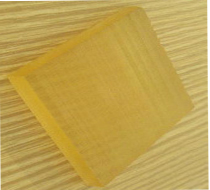
Polysulfone describes a family of thermoplastic polymers. These polymers are known for their toughness and stability at high temperatures. They contain the subunit aryl-SO2-aryl, the defining feature of which is the sulfone group. Polysulfones were introduced in 1965 by Union Carbide. Due to the high cost of raw materials and processing, polysulfones are used in specialty applications and often are a superior replacement for polycarbonates.
Polysulfone is a semitransparent, heat-resistant, thermoplastic offering excellent mechanical, electrical and chemical resistance. Polysulfone properties remain relatively consistent over a broad range of temperatures, from -150°F to 300°F, and this material is suitable for applications where autoclavability is required. The product remains stable and resists creep and deformation under continuous load and elevated temperatures. Polysulfone resists hydrolysis even under continuous use in hot water and steam at temperatures up to 300°F. It offers good resistance to detergents, hot water and steam and has excellent radiation stability.
Polysulfone (PSU) - A family of sulfur-containing thermoplastics, closely related to polyethersulfone (PES). The structure of the polysulfones is aromatic groups, generally with more than one benzene ring, joined by a sulfone group. Generally, polysulfone is a high cost, rigid, amorphous material with low moisture absorption. Reinforcement improves toughness and further enhances dimensional stability, but turns materials opaque. In addition, polysulfones are characterized by high strength, very high surface-temperature limits, low creep, good electrical characteristics, transparency, self-extinguishing ability, and resistance to greases, many solvents, and chemicals. Polysufones may be processed by extrusion, injection molding, and blow molding.
Key Features
High HDT of 207°C (405°F), Superior toughness and impact strength, Exceptional long-term hydrolytic stability, Better chemical resistance than PSU and PEI, Withstands over 1,000 cycles of steam sterilization without any significant loss of properties, Inherently flame retardant, Transparent, Colorable, Good Chemical Resistance, High Heat Resistance , Lubricated, Good Dimensional Stability , Good Toughness , Hydrolysis Resistant, Acid Resistant , Good Creep Resistance, Good Thermal Stability, Resistance to hydrolysis, Radiation stability, Hot water and steam performance to 300° F,Broad temperature range capabilities,FDA compliant.
Uses
Medical/Healthcare Applications, Aerospace Applications, Electrical/Electronic Applications, Food Service Applications , Engineering Parts , Automotive Applications, Electrical Parts, Aircraft Applications , Sporting Goods, Appliances.
Advantages
Heat resistance, Self-extinguishing, Good electrical,
Disadvantages
Attacked by some solvents, Poor , weatherability, Subject to stress cracking, Processing difficulties, Increased costs.
Typical Applications
Sterilization cases and trays, Dental and surgical instruments, Aircraft interiors, Airline catering trolleys, Hot water fittings, Plumbing manifolds, Food service trays. Polysulfone typically is used for analytical instrumentation, medical devices and semiconductor process equipment components as well as dairy connectors, manifolds and steam-cleaning equipment. The addition of glass fibers to polysulfone results in nearly a twofold increase in tensile, flexural and compressive strengths and threefold increases in modulus values. Glass reinforcement lowers mold shrinkage.The inherent properties of this material make it ideal for electrical and electronic applications.
Our extruded stock shapes of the following grades provide a wide range of performance options for demanding applications:Unfilled Polysulfone: Udel P1700 (Natural, Black), Glass reinforced Polysulfone: 10% Glass Fiber reinforced: Udel GF110 (Natural, Black).
Polysulfone (PSU) Pictures

.jpg)